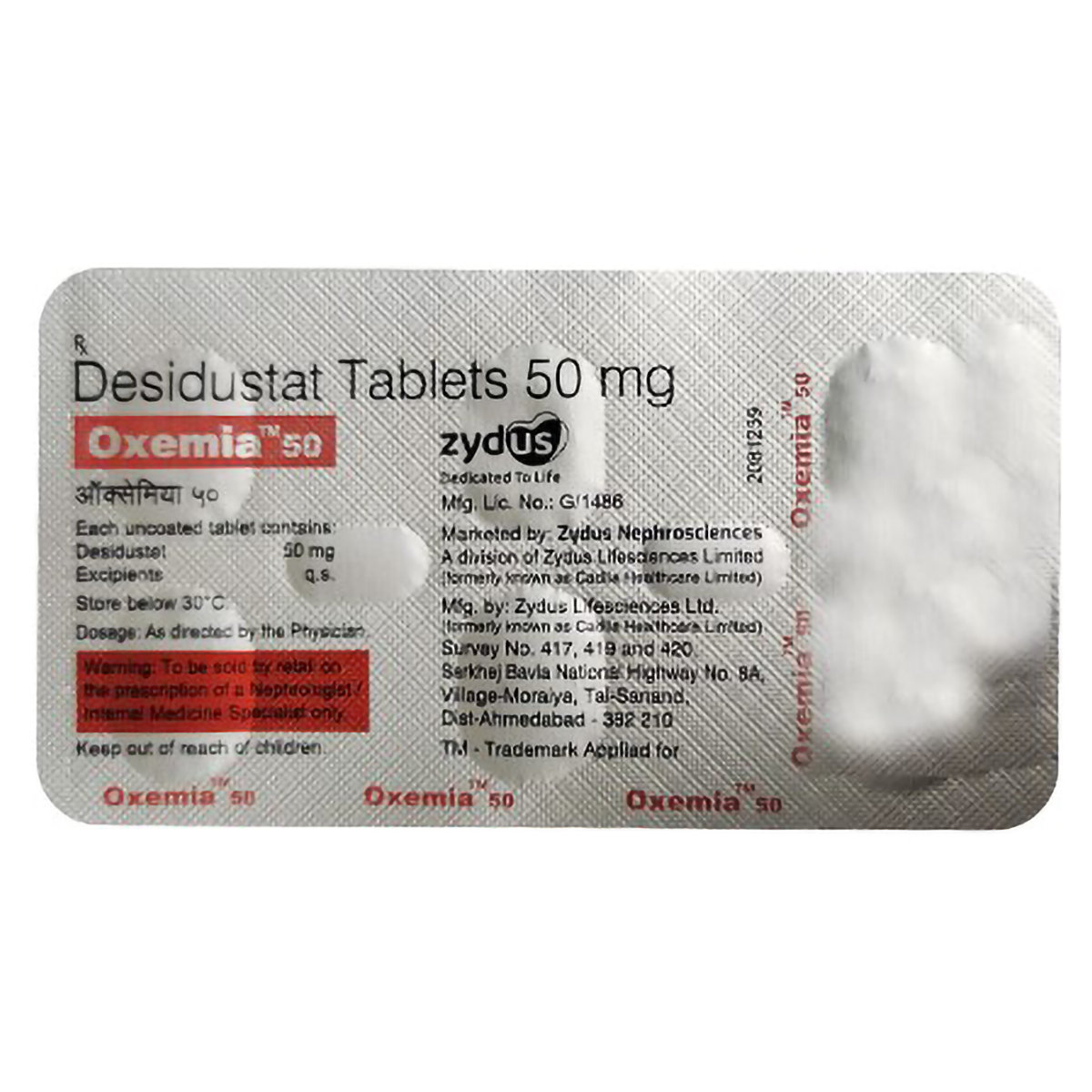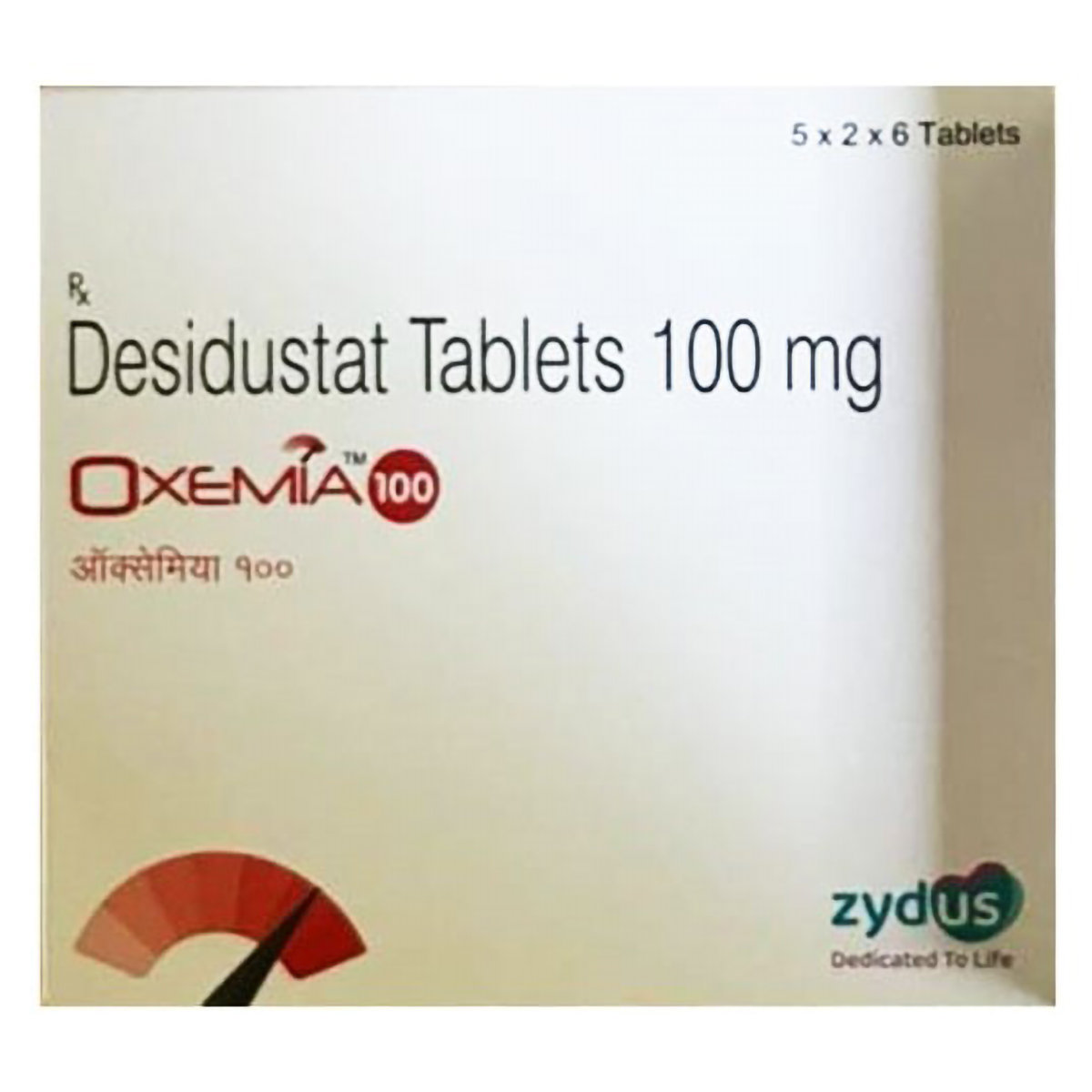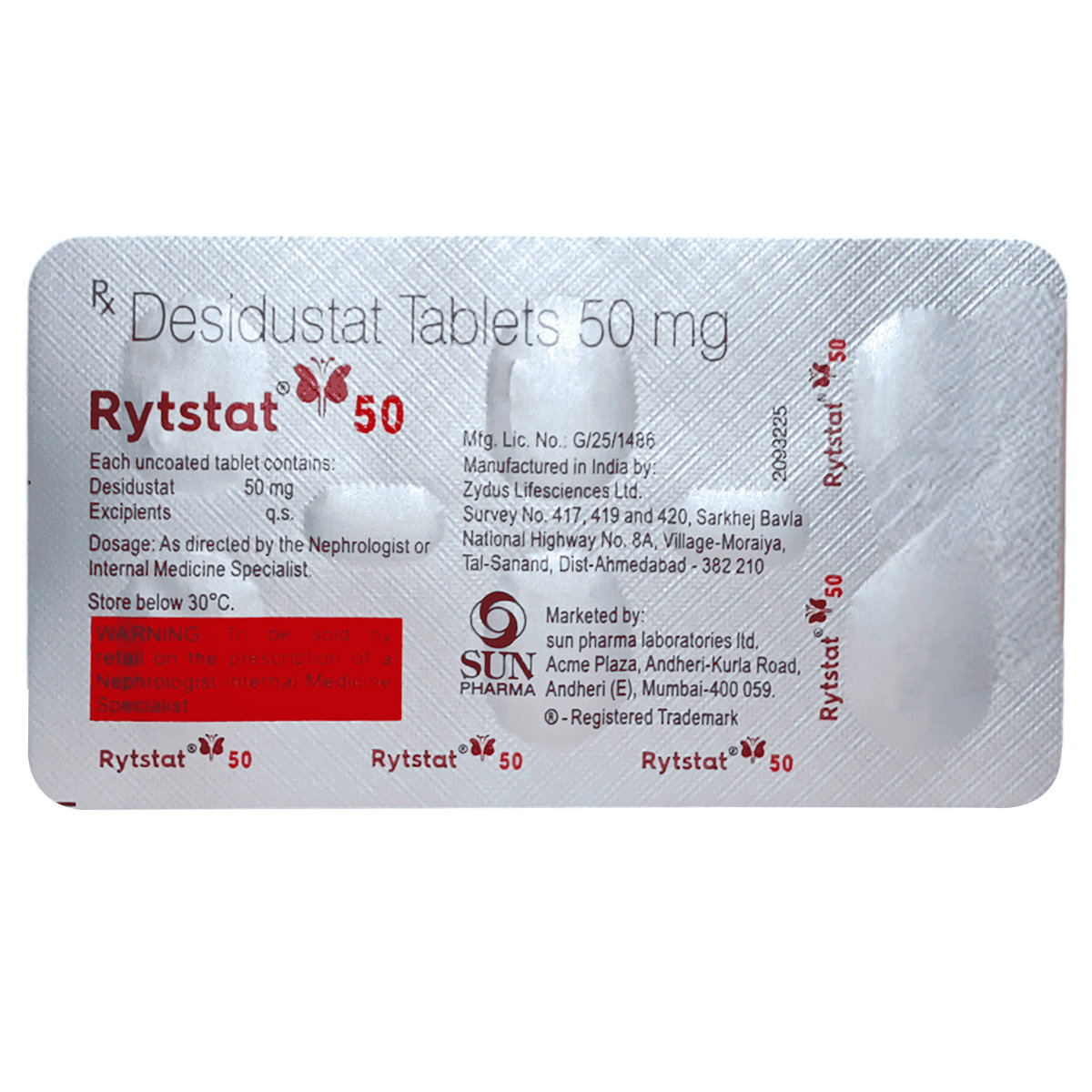Desidustat
About Desidustat
Desidustat is used to treat anaemia associated with chronic kidney disease (CKD) in patients receiving dialysis or not. Anaemia is a condition that arises when your blood produces fewer healthy red blood cells than usual.
Desidustat contains Desidustat, which works by stimulating the body's natural production of erythropoietin; this, in turn, promotes the production of red blood cells.
In some cases, Desidustat may cause side effects, including fever, vomiting, abnormal weakness, and peripheral oedema (swelling of your lower legs or hands). Most of these side effects do not require medical attention and gradually resolve over time. However, if the side effects persist, contact your doctor.
Before taking Desidustat, let your doctor know about all your medical conditions, sensitivities, and all medications you are using, including supplements and herbal products. Consult your doctor if you are pregnant, planning to become pregnant, or breastfeeding.
Uses of Desidustat
Medicinal Benefits
- Desidustat contains Desidustat, which stimulates the body's natural erythropoietic response by increasing endogenous production of erythropoietin, thereby improving haemoglobin levels and reducing anaemia-related symptoms.
- It helps raise haemoglobin concentration and hematocrit, improving oxygen-carrying capacity and enhancing patient quality of life.
- It offers a novel and convenient approach to managing anaemia in CKD, supporting better patient adherence and outcomes.
Directions for Use
- Desidustat can be taken on an empty stomach, at least 1 hour before or 2 hours after meals.
- Follow your doctor's instructions on the dosage and timing of this medication, to ensure the safety.
- Swallow it as a whole with a glass of water.
- Do not crush, break, or chew it.
Storage
Side Effects of Desidustat
- Fever
- Vomiting
- Abnormal physical weakness
- Peripheral oedema (swelling of your lower legs or hands)
Drug Warnings
- Do not take Desidustat if you are allergic to any of its components.
- Consult your doctor if you are pregnant or breastfeeding.
- Women of child-bearing potential must use appropriate contraception during treatment.
- Inform your doctor if you have any other medical conditions or if you are taking other medicines to prevent potential interactions.
Drug Interactions
Drug-Drug Interactions: No interactions were reported.
Drug-Food Interactions: No interactions were reported.
Drug-Disease Interactions: No interactions were reported.
Drug-Drug Interactions Checker List:
Safety Advice

Alcohol
cautionAvoid consumption of alcohol with Desidustat as it may cause serious side effects.

Pregnancy
cautionThere is no information available about the use of Desidustat during pregnancy. Consult your doctor if you are pregnant or suspect you are pregnant.

Breast Feeding
cautionDesidustat is not recommended during breastfeeding as it is unknown if desidustat passes into breastmilk.

Driving
safeDesidustat does not alter your ability to drive or use machinery.

Liver
consult your doctorThere is no information available about the use of Desidustat in patients with liver impairment. Consult your doctor if you have liver problems.

Kidney
safe if prescribedDesidustat is prescribed for the treatment of anaemia induced by chronic kidney disease. Your doctor will decide the dose of this medicine based on your disease condition.

Children
cautionThe safety and efficacy of Desidustat in children was not established.
Habit Forming
Diet & Lifestyle Advise
- Follow a well-balanced diet and do regular physical exercise.
- People with kidney problems are advised to limit sodium in their diet, including added salt.
- Olive oil is a healthy source of fat and phosphorus-free, making it a great option for people with kidney disease.
- Bulgur is a whole-grain wheat product that makes a terrific, kidney-friendly alternative to other whole grains high in phosphorus and potassium.
- Blueberries are packed with nutrients and are one of the best sources of antioxidants you can eat.
- Include dark-green leafy vegetables, cereals, bread, meat, pulses (beans, peas and lentils), and dried fruit like apricots, prunes and raisins in your diet.
- Increase your intake of fruits in your diet, especially fruits rich in iron, like pomegranate and citrus fruits.
- Limit the consumption of tea, coffee, milk, dairy, and foods with high levels of phytic acids, such as whole-grain cereals.
- Limit junk food items from outside and stick to freshly prepared home-cooked meals.
Special Advise
- You'll also be advised to have regular check-ups to monitor your condition.
- People with CKD may need to closely monitor sodium and phosphorus in foods, especially if their kidney disease is advanced.
Patients Concern
Disease/Condition Glossary
Anaemia: Anaemia is caused by a lack of iron in the body. Iron is an essential mineral for overall health and healthy blood cells. Iron aids in the production of haemoglobin, which is present in red blood cells. When there is a lack of iron, red blood cells do not produce enough haemoglobin to transport oxygen. Anaemia is a typical consequence of chronic renal disease (CKD). CKD indicates that your kidneys are damaged and are unable to filter blood as effectively as they should. CKD can also lead to other health issues.
FAQs
Desidustat is used to treat anaemia associated with chronic kidney disease (CKD).
Desidustat contains Desidustat, which works by stimulating the body's natural production of erythropoietin; this, in turn, promotes the production of red blood cells.
People who do not acquire enough iron, vitamin B12, and folic acid to create healthy red blood cells are more likely to develop anaemia. Excessive alcohol use increases your risk of anaemia.
Eating foods like red meat, beans, and peas can be beneficial if one has vitamin deficiency anaemia. In addition, items like dry fruits, dark green leafy vegetables, and seafood can supply the necessary vitamins and minerals.
Yes, Desidustat may cause Peripheral oedema (swelling of your lower legs or hands). If symptoms persist or bother you, reach out to the doctor immediately.
The side effects of Desidustat include vomiting, fever, abnormal physical weakness and peripheral oedema (swelling of your lower legs or hands). If these side effects persist or worsen, please consult your doctor.
Chronic kidney disease, or CKD, is an irreversible and progressive loss of kidney function. As a result, the body retains excess waste or toxins which may lead to other health problems. The symptoms include swelling of legs, shortness of breath, swelling around the eyes, weight loss, fatigue (overtiredness), decreased urine output, nausea or vomiting, especially in the morning or after eating, loss of appetite and trouble sleeping.
Your doctor may recommend a blood test to determine whether you have kidney disease. The test measures the amount of creatinine (waste product) in your blood. The doctor will use the blood test results, your gender, age, weight, and ethnic group to calculate how many millilitres of waste your kidneys should be able to filter in a minute. This calculation is known as your eGFR or estimated glomerular filtration rate. Healthy kidneys should be able to filter more than 90 mL/min. If your rate is lower than this, you may have kidney disease.
If you have diabetes, high blood pressure, heart disease, or a family history of kidney failure, you are more likely to develop kidney disease. If you have risk factors, it is advisable to get examined for kidney disease and protect your kidneys by changing your diet, lifestyle and controlling your blood glucose levels and blood pressure.
Your kidneys make erythropoietin (EPO), an important hormone that instructs your body to produce red blood cells. Kidneys fail to make enough EPO in case of kidney disease. Low EPO levels decreases red blood cell count resulting in anemia.
The risk for anemia increases when kidney disease worsens. People with CKD who also have diabetes are at a greater risk for developing anemia, likely to develop anemia earlier, and often have more severe anemia than those without diabetes. In addition, anemia with CKD is more common in people aged over 60 years.
Some of the symptoms of anemia in patients with CKD include dizziness, pale skin, fatigue (overtiredness), headache, shortness of breath, body pain, and irregular or fast heartbeats.
In patients with CKD, severe anemia can increase the risk of heart problems and strokes due to low oxygen levels in the body, which results from the decreasing level of red blood cells in the body.





